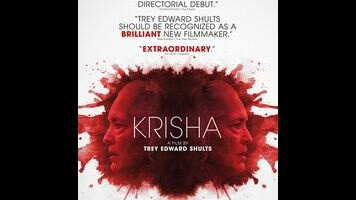The first shot of Krisha is of the title character herself: surrounded by darkness, framed center, the music swelling ominously, the camera slowly pushing in on her face as she struggles and fails to fight back tears. Who, the audience has to wonder, is this sixtysomething woman, losing her composure before the film has even begun? Don’t ask her family, the multiple generations of estranged relatives that welcome her, reluctantly, back into their lives for a holiday meal, some 10 years after she walked out on all of them. They’ve got questions of their own. Like, where has she been? And why did she leave in the first place? And what happened to the bandaged stub she used to call a finger? “As soon as I have anything incredibly revealing to say,” Krisha promises, “I will come to you and say it.” But there will be more disastrous decisions before there are answers.
Named for its central agent of chaos, herself named for the terrific unknown actress who plays her, Krisha may be the most explosive family-reunion drama since Jonathan Demme’s Rachel Getting Married—another film, incidentally, about a difficult, destructive relative seeking forgiveness, even as she teeters on the precipice of a relapse. But in this even smaller project, expanded from a short into a first feature by writer-director Trey Edward Shults, tensions don’t just rise with tempers; they’re woven into the very fabric of the film’s style. Take, for example, the film’s second shot, which depicts the arrival of our heroine (Krisha Fairchild): In a single, winding take, she crosses the driveways and manicured lawns of a suburban neighborhood, muttering nervously to herself until she finds the right house. Shults doesn’t even cut when Krisha is finally ushered inside and greeted one at a time by the family. He just sits on the moment, basking in the discomfort.
Unfolding across an especially long and awkward Thanksgiving Day, Krisha creates an audio-visual language of social anxiety; it’s practically a horror movie about the horror of being the unwanted guest at the party. Almost every stylistic choice—most of them quite dynamic, especially for a first-time director—has been made to serve Krisha’s subjective perspective, her “jumpiness.” Rhythmic montages of activity, scored to the atonal plucks of Brian McOmber’s sinister score, somehow turn the mundane activities of a holiday get-together—preparing the meal; watching the big game; horsing around in the yard—into sources of unease. These are private family rituals, not for interlopers. Likewise, several conversations are shot from eavesdropping distance, the camera creeping down hallways or lingering in doorways. Krisha keeps Krisha always on the outside, unable to participate.
Through this glancing approach, a few of the family members—all adults or teenagers, save for a newborn—come into sharper focus. Krisha’s brother-in-law Doyle (Bill Wise) presses her the hardest, but he’s got his own issues—a resentment towards his wife (Robyn Fairchild) and their pack of pet dogs (nine or 10 or 12 of them total, who can keep track?) that he expresses through loaded humor. And then there’s Krisha’s son Trey (Shults himself), who wants little to do with the parent who abandoned him; in one of the film’s toughest encounters, she attempts to break the ice by suggesting he quit business school for filmmaking, drawing only on what she used to know about his passions and interests. Krisha doles out backstory gradually through prickly conversation, but it never explains away its main character’s mistakes.
Such aversion to easy psychoanalysis is one way that the film avoids becoming a generic recovery drama, even after an element of addiction is introduced. Intangible cast chemistry is another. Shults, who worked in the camera department on several Terrence Malick movies and seems to have internalized the master’s improvisational process, shot Krisha in his parents’ home, casting several friends and family members—a decision probably made out of necessity that nonetheless lends the offhand holiday-hangout scenes a genuine authenticity. To that end, his best decision was handing his aunt, an actor with only bit parts to her name, the lead role. Fairchild skillfully navigates Krisha’s humiliating ordeal, making her discomfort palpable; you can see the character working out when to say what she wants and when to stay quiet, and you believe it when sheer alienation presses her to extreme measures. It’s the kind of vanity-free performance that Gena Rowlands could have delivered 40 years ago. (Not for nothing, and perhaps not just for its made-on-the-cheap ingenuity, did the film win the John Cassavetes Award at the Indie Spirits this year.)
At just 82 minutes, Krisha wouldn’t have hurt for a little more meat on its bones; the last act blows through a shitstorm of confrontation almost too abruptly. But there’s also something bracingly unsentimental about its upshot. If Krisha’s about more than just putting its audience through one woman’s crucible of atonement, it may be about the limits of forgiveness. How many second chances does a loved one get, especially when they refuse to either change or explain their behavior? Because we share her perspective, it’s easy to feel sympathy for Krisha, fighting for the affection and respect of a family she bailed on. But that doesn’t mean we have to ultimately cave to her emotional appeals. That might be the movie’s most powerful achievement: It literally puts us on its protagonist’s side, then dares us not to abandon it for the other one.









































